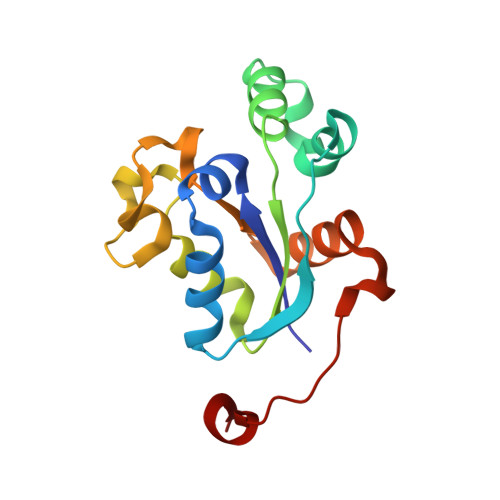Characterization of a Schistosoma mansoni NDPK expressed in sexual and digestive organs.
Torini, J.R., de Freitas Fernandes, A., Balasco Serrao, V.H., Romanello, L., Bird, L.E., Nettleship, J.E., Owens, R.J., Brandao-Neto, J., Zeraik, A.E., DeMarco, R., D'Muniz Pereira, H.(2019) Mol Biochem Parasitol : 111187-111187
- PubMed: 31103556
- DOI: https://doi.org/10.1016/j.molbiopara.2019.111187
- Primary Citation of Related Structures:
5IOL, 5IOM, 5KK8 - PubMed Abstract:
Nucleoside diphosphate kinases (NDPKs) are crucial to keep the high triphosphate nucleotide levels in the biological process. The enzymatic mechanism has been extensively described; however, the structural characteristics and kinetic parameters have never been fully determined. In Schistosoma mansoni, NDPK (SmNDPK) is directly involved in the pyrimidine and purine salvage pathways, being essential for nucleotide metabolism. The SmNDPK enzymatic activity is the highest of the known purine metabolisms when compared to the mammalian NDPKs, suggesting the importance of this enzyme in the worm metabolism. Here, we report the recombinant expression of SmNDPK that resulted in 1.7 and 1.9 Å apo-form structure in different space-groups, as well as the 2.1 Å SmNDPK.ADP complex. The binding and kinetic assays reveal the ATP-dependence for enzyme activation. Moreover, in situ hybridization showed that SmNDPK transcripts are found in reproductive organs and in the esophagus gland of adult worms, which can be intrinsically related with the oviposition and digestive processes. These results will help us fully understand the crucial participation of this enzyme in Schistosoma mansoni and its importance for the pathology of the disease.
- Laboratório de Biologia Estrutural, Instituto de Física de São Carlos, Universidade de São Paulo, 13563-120, São Carlos, SP, Brazil.
Organizational Affiliation:
















